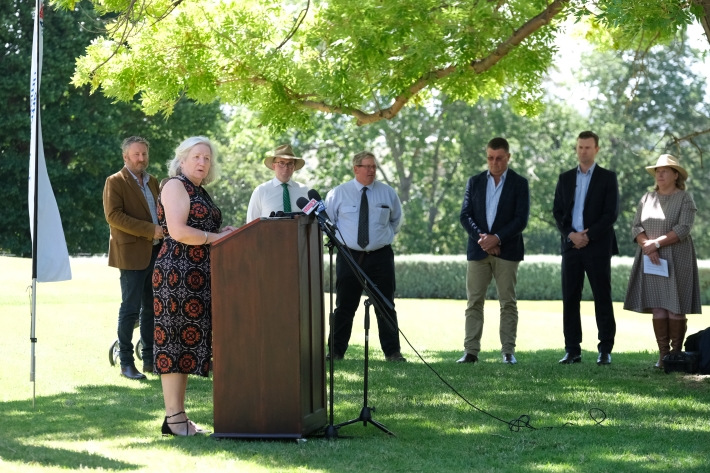



Genetic gain in the beef industry – Southern Multi-breed Project
University of New England (UNE) animal scientists will play a vital role in a multi-million-dollar collaborative research project that will help drive the rate and value of genetic progress in individual beef cattle herds and the beef industry as a whole.
Jointly funded by the NSW Department of Primary Industries (DPI), UNE and the Commonwealth Government via the MLA Donor Company, the project will underpin the development of multi-breed BREEDPLAN Estimated Breeding Values (EBVs) in Australia for the Angus, Hereford, Shorthorn, Wagyu, Charolais and Brahman breeds, and enhance the ability of the breeds involved to exploit genomic technologies to accelerate valuable genetic improvement.
Funding for the project was officially announced by the NSW Minister for Agriculture Adam Marshall on Thursday 10th December at an event at UNE.
Dr Robert Banks, Director of UNE’s Animal Genetics and Breeding Unit (AGBU) said the five-year long project will include collection of DNA data on beef cattle, covering key breeds used in southern Australia as well as linking to the northern beef industry through the inclusion of the Brahman breed.
“To start the process of multi-breed evaluation a large recording project was needed to measure the performance of cattle from different breeds, essentially running them head to head in the same environments, Dr Banks said
“There has been a long history of genetic evaluation based on single breeds of beef cattle which has allowed stud breeders to achieve very valuable rates of genetic progress but commercial cattle producers often find it difficult to make selection decisions across breeds or to design effective crossbreeding programs.”
The $7.3 million project titled “Delivering resource populations for multi-breed genomic evaluation in beef cattle,’ also known as The Southern Multibreed Project, is creating a large reference dataset of animal performance and DNA test records from six key breeds of beef cattle, that include; Angus, Shorthorn, Hereford, Charolais, Wagyu, and Brahman.
These records can then be used to underpin national genetic evaluations through BREEDPLAN, and to enable direct comparisons across the different breeds.
In addition to enabling direct genetic comparisons between animals of the different breeds, the project will enhance the ability of breeders to use advanced genomic technologies in identifying animals with the best genetic makeup. Genomic technologies are based on reading the DNA of animals and identifying patterns in the DNA associated with outstanding performance for traits important in beef value chains – on and off-farm.
The research involves raising cattle on five NSW DPI research farms before finishing the steers at UNE’s Tullimba feedlot. “This gives us a huge scope to record traits from birth all the way through to the end product,” Dr Banks said. “The design of the project includes identifying which matings – what bulls are mated to what cows – that will generate the most information possible”.
In collaboration with DPI, the UNE Meat Science team led by Dr Peter McGilchrist, will be contributing detailed measurement of a wide range of traits relating to the eating quality of meat; and UNE’s Dr Sam Clark will be leading post-doctoral research focussed on how the beef industry can best utilise the results of the project.
The focus of the on-farm research is on three broad areas, including; animal growth and efficiency, cow fertility and carcass traits like marbling.
Kate Lorimer-Ward, Deputy Director General Agriculture, NSW DPI, said the cow herd and their progeny provide an ideal resource for evaluating any new traits across breeds that can address the challenges of the future such as temperament and welfare, as well as new meat quality traits.
“Given that all animals are DNA tested it also allows us to dive deeper so we can understand what makes different breeds of beef cattle genetically different. Instead of relying solely on physical appearance”, she said.
“There is also scope for others to utilise this resource to measure other novel traits like methane and consumer eating quality.
“This project is a major piece of knowledge-building for the beef industry, and could not be achieved without the close collaboration of UNE and NSW DPI, supported by Meat and Livestock Australia. And the project will underpin training future researchers – vital for the continued viability of the industry.”
The project will be run by the collaboration of NSW DPI, the University of New England and the Animal Genetics and Breeding Unit (AGBU), building on the close relationship between the university and NSW DPI stretching back over five decades (including the AGBU joint venture).


